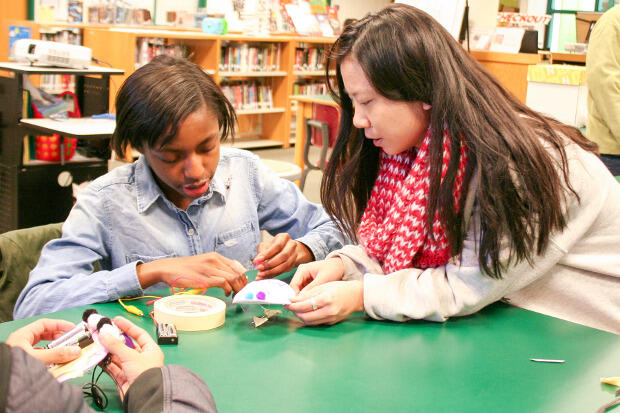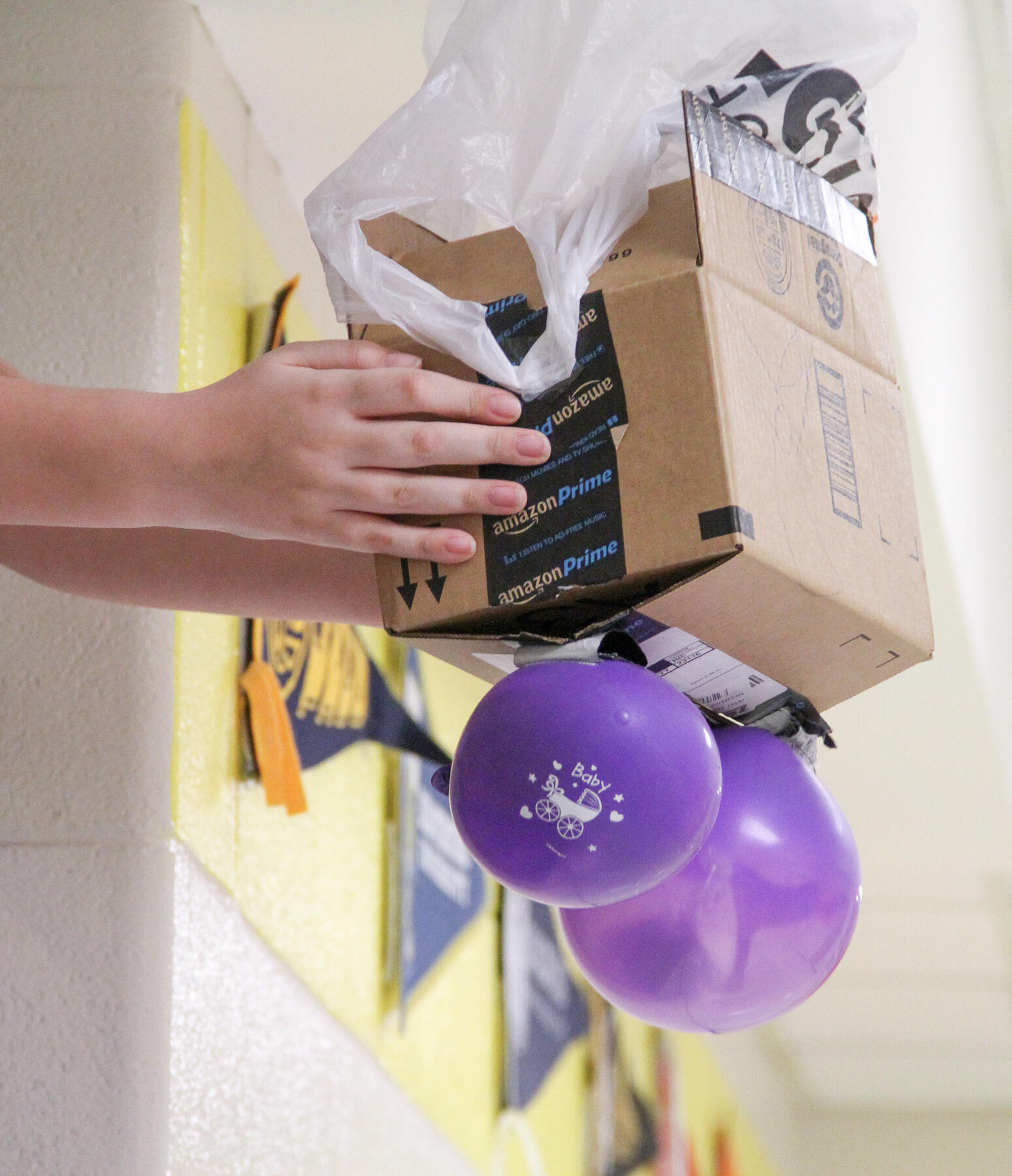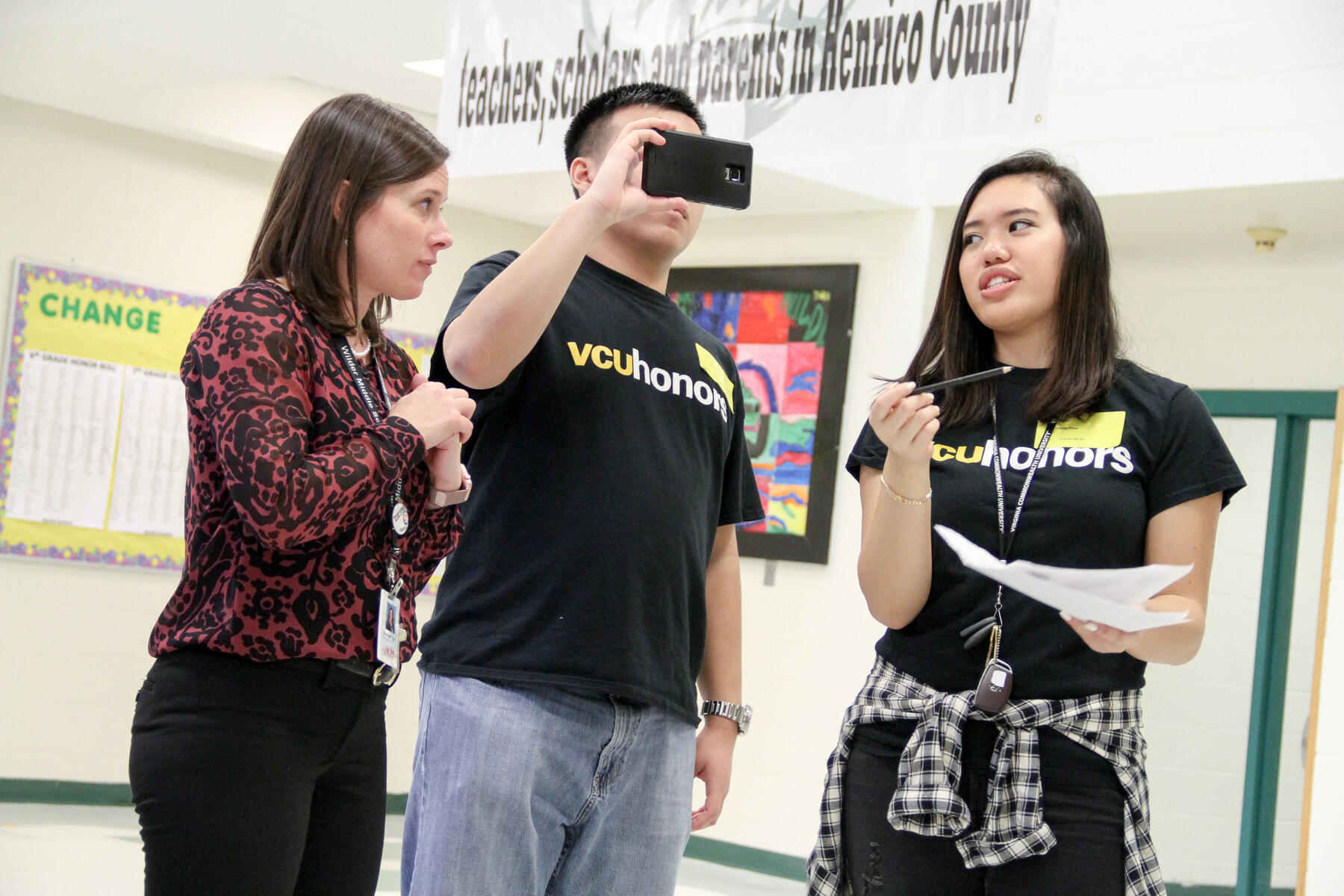
<br>Photo by Patrick Kane, University Public Affairs
March 14, 2017
Honors College students mentor, tutor Henrico middle schoolers at STEM Academy
Share this story
At L. Douglas Wilder Middle School in Henrico County, three students climb a staircase and toss eggs to the floor — for science.
Inspired by a mission to the moon, these eggs have become astronauts. They have been encased in a lunar lander — designed from cardboard, bags and other materials — to protect the eggs from a harsh landing.
VCU Honors College students Tiffany Phan and David Tek record video and take notes as the lander smacks onto a paper target on the floor. The eggs are unwrapped and, luckily, found unharmed.

The middle school students are participating in the STEM Exploration and Enrichment Academy. Phan and Tek are among 10 Virginia Commonwealth University mentors for the after-school program, which grew out of a partnership between the Honors College, Life Sciences’ Center for the Study of Biological Complexity and Henrico County Public Schools, with grant support from the Council for Community Engagement.
The STEM academy is part of a push to identify and provide opportunities to students at Brookland, John Rolfe, Fairfield and Wilder middle schools.
“We needed more resources for our underrepresented gifted students,” said Janet Nowlin, gifted resource teacher at Wilder and secondary gifted coordinator for Henrico County schools. “We have academic needs as well as socioeconomic needs. We know that we have high ability and gifted kids here.”
Creating the STEM Academy
Two years ago, Nowlin invited VCU Honors students to speak with gifted high school students at Hermitage, Henrico and Tucker high schools. That led to discussions about other ways VCU could help in local public education.
“When the Council for Community Engagement Grant came along, I immediately thought of Janet. It was a perfect fit because she is working with high-achieving students, and that’s also our population,” said Jacqueline Smith-Mason, Ph.D., associate dean of the Honors College.
Allison Johnson, Ph.D., assistant director of the Center for Biological Complexity, is the second VCU partner involved in the project. After receiving the CCE grant last summer, the STEM Academy started in October and continued into this semester.
A lot of these kids are the smartest kid in their class.
The enrichment program provides a forum for gifted students to challenge themselves and prepare for high school and college, Nowlin said.
“A lot of these kids are the smartest kid in their class, all the time,” she said. “They’ve always been in charge. Getting them to understand that, ‘Wow, maybe I’m not the only one with the right answer’ — it’s something that a lot of them haven’t encountered before.”
Three flavors of STEM
<slideshow id=159 align=center width=620>
Working alongside Henrico County teachers, VCU students are guiding about 60 students through three tracks: a mini medical school, environmental studies, and the space academy.
Taruni Maganti, a freshman biology and sociology major, and Renee Beck, a freshman health, physical education and exercise science major, help students build motorized “jitterbugs” as they learn about the role of bugs in the ecosystem.
“I think it’s a really cool opportunity. My school never had anything like this, an after-school STEM program for middle-school kids. They are able to get experiences and do things that high-school students haven’t even done,” Beck said. “For me, I never really got into STEM until junior year of high school, so it’s really cool that they are fostering this strong relationship.”
Middle schoolers in the environmental study track are collecting and testing water samples, building bug houses, and learning about composting.
“I like that they bring in different middle schools from the area, so they can meet new people and make new friends,” Maganti said. “It’s interesting to hear the different things they say, and their different perspectives on everything they are learning about.”
The Division for Health Sciences Diversity hosted students for a tour of the VCU School of Medicine, while VCU Life Sciences is arranging a visit to the Rice Rivers Center in Charles City County.
Familiarity with science, technology, engineering and math careers is “an exposure gap, as much as anything else,” Nowlin said. “They don’t have family at home who are in science, engineering or the STEM fields so they just don’t have exposure. When you show them, oh boy! They are excited.”
Morgan Kimmel, a sophomore health, physical education and exercise science major working with students in the mini medical school, helps bridge that knowledge gap.
“A lot of them have the idea that they want to go in the field, and they have the interest,” she said. “What we’re here as college students to do is tell them about what kind of education you need, what classes to take and help guide them to a framework to work with.”
All Henrico County students learn about the specialty centers housed in county high schools when they are in eighth grade, but the STEM academy is an opportunity to entice younger students.
“Because Henrico County does such a great job with specialty centers — every high school has at least one — the kids have options,” Nowlin said. “We want them to be excited about those opportunities in high school, and we want them to be working hard in middle school for those opportunities.”
A college connection
The academy offers a space for students to become more familiar with college.
“I think, as college students, as opposed to an actual teacher, it’s more of an informal dialog. They probably are more receptive. We can be more of a role model, instead of an authority figure,” Kimmel said.
Nowlin agreed.
“That’s part of the reason that we wanted college students involved. There’s definitely a different relationship with the college students than with the teachers,” she said. “They are working with the kids, talking college with them, and trying to expose them to the college-going attitude of, ‘I want to do this,’ and, ‘How do I get there.’”
Smith-Mason said Honors students are highly engaged in the Richmond area, so they jumped at the chance to work with the STEM academy.

“Here, being leaders on campus, they are going out in the community anyway and helping students. It was a natural, good fit for us,” she said.
Smith-Mason hopes that Honors students take away the importance of giving back, along with “recognizing that learning is not just the textbook, but taking what they learn in the classroom and actually applying it.”
Kimmel said the academy is “getting me out of my shell and making me less shy.”
“Most of the time, the kids didn’t come up to me and ask questions. It was more me going up and probing them for questions,” she said.
The academy wraps up this semester with a parent empowerment event. Nowlin and Smith-Mason hope to continue the academy in the future, and infuse STEM education into more area middle schools.
“They are making connections to us, through our students,” Smith-Mason said. “Hopefully [we are] building some bridges so that when it’s time for them to apply for college, VCU and the Honors College will be on their radar as options for them.”
Subscribe for free to the VCU News email newsletter at http://newsletter.news.vcu.edu/ and receive a selection of stories, videos, photos, news clips and event listings in your inbox every Monday and Thursday.
Subscribe to VCU News
Subscribe to VCU News at newsletter.vcu.edu and receive a selection of stories, videos, photos, news clips and event listings in your inbox.









